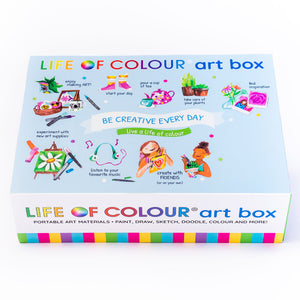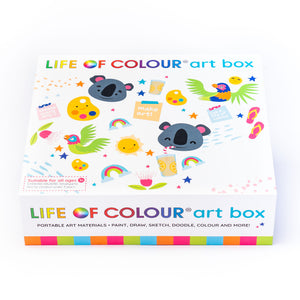by Ella Hore
The best way to express your inner watercolour skills is on gift cards! Simple designs like this easy ombre sky with Life of Colours brush pens look fabulous on a blank white card. Once you master the ombre blending, there’s so many colour combinations you can try to create your own set of original gift cards. But remember to figure out your colour order for the sky on your card before applying. Personalising your own handmade gift cards with unique designs is such a lovely touch to presents, anyone will feel special to receive one! Getting started is no struggle, gather your materials and get practicing those techniques, you’ll master it in no time.
Watch the video then read step by step how it's done and what materials were used.
THE KEY MATERIALS YOU WILL NEED
For these little cards, you’re going to need a few things to get started. Of course, the first thing you’ll need is your own set of Life of Colour watercolour brush pens. These beauties come in a pack of 20 colours including pastels, fluros, natural and primary colours. There’s plenty of amazing colour combinations for you to try. You’ll also need a water brush which so conveniently comes in the pack. You can always use a single paintbrush and water. Now the key ingredient to blending colours is a blending tray. Any ‘trinket tray’ or piece of plastic that you can wipe afterwards will work fine. You’ll also need a black fine tip pen to add some illustrations over the sky. And of course, lastly, your canvas. Because you will be using watercolour, it is suggested to cut out a rectangle from watercolour paper and fold it in half to create a square card. It doesn’t really matter how big the card can be its up to you! Read the blending tips section below to find a list of suggested watercolour paper brands we recommend. We used “Reeves” medium watercolour paper!
HOW TO MAKE THIS CARD STEP BY STEP
First gather the materials you will need. Use the information above to help you plan what you will need.
Now it’s time to prepare your palette! To make new colours and dilute the ink of the brush pens, scribble a little ink from one or multiple of the pens onto your blending tray and then mix it up with a few droplets of water. Test your new colour out and adjust if needed.
Start by applying the colour at the top of the page by using any of the brush techniques below. Depending on what type of sky you want, you can blend different colours like in the picture or just different shades of a single colour.
Next allow the watercolour to dry. Patting it with towel or using a hairdryer is a quicker way to do this.
Finally add some illustrations down the bottom. On this card there’s a little house, smoke, and trees drawn in black fine tip along the horizon of the sky. But be creative and maybe try something different!
Now your personalised card is finished!
BRUSH TECHNIQUES TO USE IN THIS DESIGN
The best way to start is by giving some of these techniques a try. In order to get that smooth ombre look in the sky, watering down the colours is recommended. This really helps with the applying process. Also, for the best outcome, we recommend using certain watercolour paper brands. You can find a list down in the “blending tips” section!
THE WET-ON-WET TECHNIQUE
This technique is easy and works great for this design. By stroking some water onto the paper and then brushing on some colour from the top down, you can see the bleeding of colour down the card right away!
THE USUAL WET-ON-DRY
The simplest technique in the list – apply the colour straight on! By already diluting the colour down, your colours won’t be as vibrant and strong but once you blend other shades or colours downwards, your sky will come together and look uniquely amazing!
BUILDING UP COLOUR
For a single coloured sky, for example, a blue sky, building up colour creates interest. Its’ recommended to have mixed a few different shades beforehand. Start by applying your strongest shade at the top and blending it out a bit. Rinse your brush and pick up a less concentrated shade to stroke side to side downwards, overlapping the first shade. Continue with different, less concentrated shades and blend out the colour evenly to finish it off.
CREATING GRADIENTS
This technique is similar to building up colour but instead you are playing with two different colours instead of shades. Prepare two colours and aim to have a 50/50 ratio of water to ink for each colour. To transition from one colour to the other apply, one colour on the top and blend it out a bit. Pick up a more diluted shade and stroke side to side. Continue blending one colour until halfway when you change to a very diluted version of your other colour. Continue brushing downwards picking up more concentrated colour as you’re going down. Once you’re at the bottom of the card, rinse your brush and go back and even out some parts of the gradient.
BLENDING TIPS THAT’LL REALLY HELP
Here’s some things that are so worth noticing when mastering the art of watercolour!
- Work from either dark to light or light to dark
- Paper towels are super handy if you accidentally drop a bit of water on the page
- Bleeding colours into each other looks really amazing (use the wet-on-wet technique)
- Limit your colour palette, we all want to use every colour but its best to use a limited range
- Some watercolour paper brand suggestions are: canson XL, reeves, Windsor and newton, Derwent academy
Don’t forgot to share your finished creations with us!
Ella is a resident artist for Life of Colour and regularly shares her art using Life of Colour products on her instagram @its_artsy_ella
Ella is 15 years old from Queensland, Australia!













Leave a comment (all fields required)